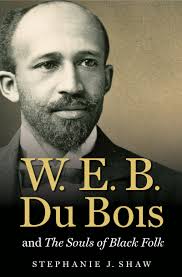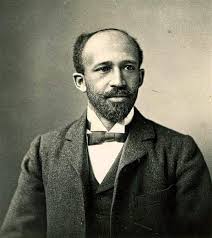The Souls of Black Folk Page #39
The Souls of Black Folk is a 1903 work of American literature by W. E. B. Du Bois. It is a seminal work in the history of sociology and a cornerstone of African-American literature. The book contains several essays on race, some of which the magazine Atlantic Monthly had previously published.
And finally, now, to-day, when we are awakening to the fact that the perpetuity of republican institutions on this continent depends on the purification of the ballot, the civic training of voters, and the raising of voting to the plane of a solemn duty which a patriotic citizen neglects to his peril and to the peril of his children’s children,—in this day, when we are striving for a renaissance of civic virtue, what are we going to say to the black voter of the South? Are we going to tell him still that politics is a disreputable and useless form of human activity? Are we going to induce the best class of Negroes to take less and less interest in government, and to give up their right to take such an interest, without a protest? I am not saying a word against all legitimate efforts to purge the ballot of ignorance, pauperism, and crime. But few have pretended that the present movement for disfranchisement in the South is for such a purpose; it has been plainly and frankly declared in nearly every case that the object of the disfranchising laws is the elimination of the black man from politics. Now, is this a minor matter which has no influence on the main question of the industrial and intellectual development of the Negro? Can we establish a mass of black laborers and artisans and landholders in the South who, by law and public opinion, have absolutely no voice in shaping the laws under which they live and work? Can the modern organization of industry, assuming as it does free democratic government and the power and ability of the laboring classes to compel respect for their welfare,—can this system be carried out in the South when half its laboring force is voiceless in the public councils and powerless in its own defence? To-day the black man of the South has almost nothing to say as to how much he shall be taxed, or how those taxes shall be expended; as to who shall execute the laws, and how they shall do it; as to who shall make the laws, and how they shall be made. It is pitiable that frantic efforts must be made at critical times to get law-makers in some States even to listen to the respectful presentation of the black man’s side of a current controversy. Daily the Negro is coming more and more to look upon law and justice, not as protecting safeguards, but as sources of humiliation and oppression. The laws are made by men who have little interest in him; they are executed by men who have absolutely no motive for treating the black people with courtesy or consideration; and, finally, the accused law-breaker is tried, not by his peers, but too often by men who would rather punish ten innocent Negroes than let one guilty one escape. I should be the last one to deny the patent weaknesses and shortcomings of the Negro people; I should be the last to withhold sympathy from the white South in its efforts to solve its intricate social problems. I freely acknowledged that it is possible, and sometimes best, that a partially undeveloped people should be ruled by the best of their stronger and better neighbors for their own good, until such time as they can start and fight the world’s battles alone. I have already pointed out how sorely in need of such economic and spiritual guidance the emancipated Negro was, and I am quite willing to admit that if the representatives of the best white Southern public opinion were the ruling and guiding powers in the South to-day the conditions indicated would be fairly well fulfilled. But the point I have insisted upon and now emphasize again, is that the best opinion of the South to-day is not the ruling opinion. That to leave the Negro helpless and without a ballot to-day is to leave him not to the guidance of the best, but rather to the exploitation and debauchment of the worst; that this is no truer of the South than of the North,—of the North than of Europe: in any land, in any country under modern free competition, to lay any class of weak and despised people, be they white, black, or blue, at the political mercy of their stronger, richer, and more resourceful fellows, is a temptation which human nature seldom has withstood and seldom will withstand. Moreover, the political status of the Negro in the South is closely connected with the question of Negro crime. There can be no doubt that crime among Negroes has sensibly increased in the last thirty years, and that there has appeared in the slums of great cities a distinct criminal class among the blacks. In explaining this unfortunate development, we must note two things: (1) that the inevitable result of Emancipation was to increase crime and criminals, and (2) that the police system of the South was primarily designed to control slaves. As to the first point, we must not forget that under a strict slave system there can scarcely be such a thing as crime. But when these variously constituted human particles are suddenly thrown broadcast on the sea of life, some swim, some sink, and some hang suspended, to be forced up or down by the chance currents of a busy hurrying world. So great an economic and social revolution as swept the South in ’63 meant a weeding out among the Negroes of the incompetents and vicious, the beginning of a differentiation of social grades. Now a rising group of people are not lifted bodily from the ground like an inert solid mass, but rather stretch upward like a living plant with its roots still clinging in the mould. The appearance, therefore, of the Negro criminal was a phenomenon to be awaited; and while it causes anxiety, it should not occasion surprise. Here again the hope for the future depended peculiarly on careful and delicate dealing with these criminals. Their offences at first were those of laziness, carelessness, and impulse, rather than of malignity or ungoverned viciousness. Such misdemeanors needed discriminating treatment, firm but reformatory, with no hint of injustice, and full proof of guilt. For such dealing with criminals, white or black, the South had no machinery, no adequate jails or reformatories; its police system was arranged to deal with blacks alone, and tacitly assumed that every white man was ipso facto a member of that police. Thus grew up a double system of justice, which erred on the white side by undue leniency and the practical immunity of red-handed criminals, and erred on the black side by undue severity, injustice, and lack of discrimination. For, as I have said, the police system of the South was originally designed to keep track of all Negroes, not simply of criminals; and when the Negroes were freed and the whole South was convinced of the impossibility of free Negro labor, the first and almost universal device was to use the courts as a means of reenslaving the blacks. It was not then a question of crime, but rather one of color, that settled a man’s conviction on almost any charge. Thus Negroes came to look upon courts as instruments of injustice and oppression, and upon those convicted in them as martyrs and victims.
Translation
Translate and read this book in other languages:
Select another language:
- - Select -
- 简体中文 (Chinese - Simplified)
- 繁體中文 (Chinese - Traditional)
- Español (Spanish)
- Esperanto (Esperanto)
- 日本語 (Japanese)
- Português (Portuguese)
- Deutsch (German)
- العربية (Arabic)
- Français (French)
- Русский (Russian)
- ಕನ್ನಡ (Kannada)
- 한국어 (Korean)
- עברית (Hebrew)
- Gaeilge (Irish)
- Українська (Ukrainian)
- اردو (Urdu)
- Magyar (Hungarian)
- मानक हिन्दी (Hindi)
- Indonesia (Indonesian)
- Italiano (Italian)
- தமிழ் (Tamil)
- Türkçe (Turkish)
- తెలుగు (Telugu)
- ภาษาไทย (Thai)
- Tiếng Việt (Vietnamese)
- Čeština (Czech)
- Polski (Polish)
- Bahasa Indonesia (Indonesian)
- Românește (Romanian)
- Nederlands (Dutch)
- Ελληνικά (Greek)
- Latinum (Latin)
- Svenska (Swedish)
- Dansk (Danish)
- Suomi (Finnish)
- فارسی (Persian)
- ייִדיש (Yiddish)
- հայերեն (Armenian)
- Norsk (Norwegian)
- English (English)
Citation
Use the citation below to add this book to your bibliography:
Style:MLAChicagoAPA
"The Souls of Black Folk Books." Literature.com. STANDS4 LLC, 2025. Web. 11 Jan. 2025. <https://www.literature.com/book/the_souls_of_black_folk_310>.




Discuss this The Souls of Black Folk book with the community:
Report Comment
We're doing our best to make sure our content is useful, accurate and safe.
If by any chance you spot an inappropriate comment while navigating through our website please use this form to let us know, and we'll take care of it shortly.
Attachment
You need to be logged in to favorite.
Log In